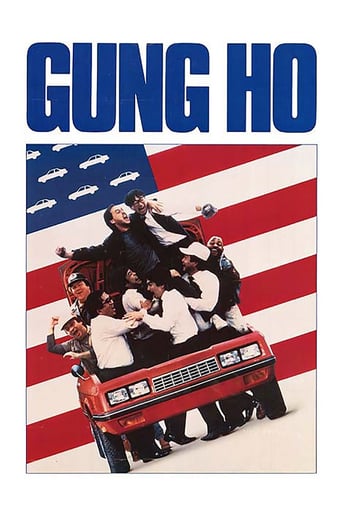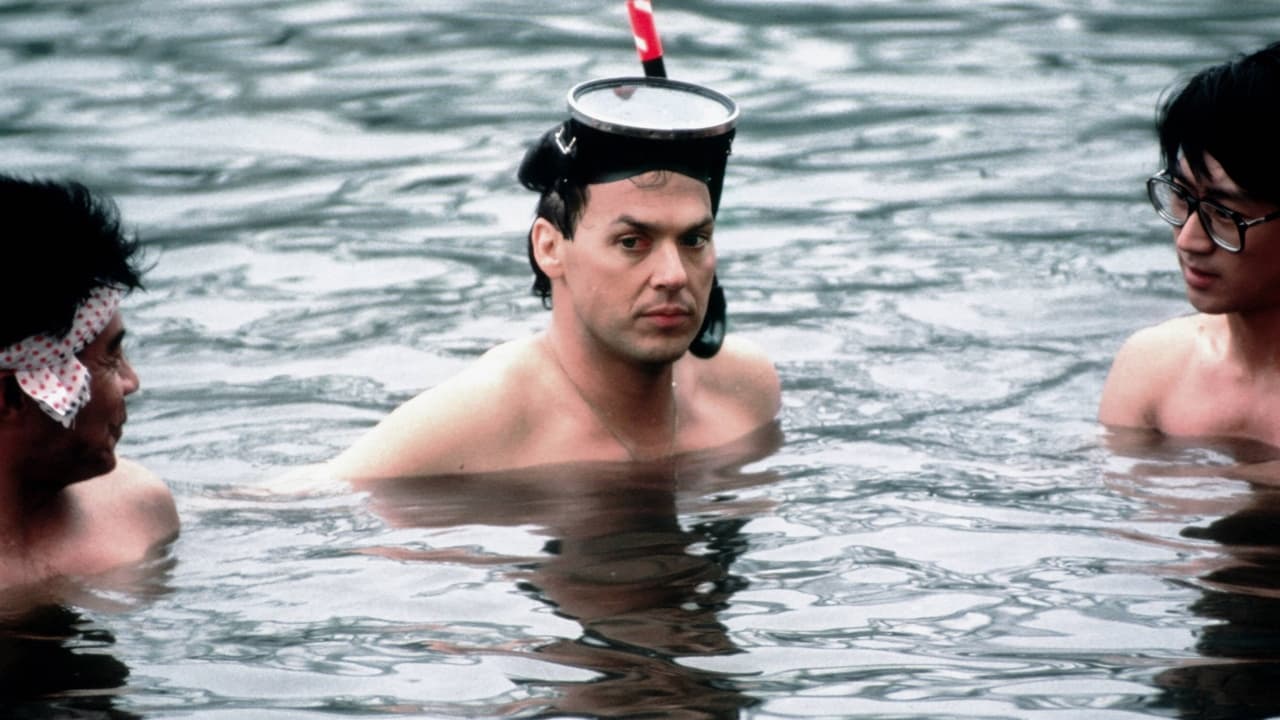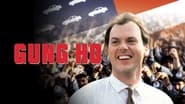videorama-759-859391
This may not be the funniest comedy, as the movie raises a few guffaws here and there, but it's the very real scenario in the clash of two cultures that makes the comedy work. Again, this film, originated from a song, deals with car union boss (Keaton again working his winning on screen presence) merging with a Japanese boss (Watanabe) at an American car plant. Now in new hands, the American workers are butting heads, especially Wendt's character, with their new Asian bosses, as they have different work strategies and ethics. The film masks and breathes real life into the complications that arise between both parties, (Watanabe's boss is a real sour puss) where to the Asians, American workers are slack. There lies a real challenge, if you turn out 15000 cars a month, as everything the Japanese do are quick. Just look at the new unoccupied cities they build. It also shows how conformity sucks, something in real life, I think, sucks. Keaton's way of dealing and manipulating this, I liked, but does bow to the bosses demands, put on himself on some occasions, the cold skinny dipping scenes with him and his counterparts, overtly so. Watanabe's character I liked because, he's the only real one, who gets how America thinks, and is sympathetic, like when a workker injures himself. He can't show this of course, cause he'll cop crap from the bigger guns, and that will ruin his career, which as you see, reflects on his own personal life. The dinner meeting at his home, the scene seemed very hostile and standoffish, and I really liked Mimi Rodgers defiance to stay at the table, where the other woman were told to leave. That was brassy. The Pretenders 86 hit, "Don't Get Me Wrong" over the opening credits, of the aptly titled Working Class Man, a.k.a Gung Ho seemed weird, or questionable, where the title song rocks at the end, over end credits, with a sea of plant workers doing exercises whatever, one thing, our fine American workers, find stupid. An insightful and well crafted film/comedy, and a definite recommendation from me. Just don't rely solely on it for laughs.
tieman64
"Thus did a handful of rapacious citizens come to control all that was worth controlling. Honest, industrious citizens were classed as bloodsuckers if they asked to be paid a living wage, and praise was reserved henceforth for those who devised means of getting paid enormously for committing crimes against which no laws had been passed." - Kurt Vonnegut Ron Howard's "Gung Ho" stars Michael Keaton as Hunt Stevenson, a factory worker at an auto plant in Hadleyville, Pennsylvania. When the plant is purchased by Assan Motors, a Japanese company, Hunt becomes a liaison between Japanese bosses and American workers.For most of its running time, "Gung Ho" is a slick, well-shot and funny feature. Here, Japanese capitalism is shown to be dangerously obsessed with production, exploitation and servitude. In contrast, American workers and bosses are shown to be slovenly, lackadaisical and overly individualistic, traits which hamper corporate profits.By the film's end, however, Howard reveals "Gung Ho's" quite sinister message: the worker of tomorrow is better off if he adopts a mixture of Eastern and Western values. Work hard, increase production and put your job first, and mega-corporations won't fire you, abandon you and go seeking cheaper labour elsewhere. But don't work too hard; after-all, an alive worker is a good worker.That this is not only a form of social blackmail, and a false binary – the worker forced to choose between two types of the same exploitation – doesn't occur to Howard. That capitalism's many contradictions means that it must, in aggregate, lead to bankruptcy, debt, unemployment, downsizing, lowered wages and unemployment regardless of "efficiency" or "the behaviour of the worker", doesn't occur to him either. Co-starring Mimi Rogers, the film quite cleverly positions its audience to sympathise with what would otherwise be deemed racial stereotypes.7.5/10 - Worth one viewing.
TxMike
Just today, holed up with a bad head cold on a wet and dreary day, I watched this old movie. Simply because I wanted to see some old Michael Keaton movies I had missed. This is mostly a comedy just for the sake of comedy, but there is a cultural message here. The Japanese find out how hard it is to have a bunch of blue-collar Pennsylvanians make cars the Japanese way, efficiency, zero defects , and all that. And the Americans find out that they can't just keep on doing "business as usual" and keep jobs in their community.Michael Keaton is auto worker Hunt Stevenson, sent by the mayor to Japan to court Assan Motors in the hopes of re-starting a car factory and re-vitalize their community. Hunt thinks he botches the assignment, but somehow the Japanese are impressed and schedule a visit to the plant site. The deal is made, the workers begin making cars. Defects and all. "We can't make these perfect, those flaws are for the dealer to fix." American Gedde Watanabe is the Japanese plant manager, Oishi Kazihiro. Anyway the movie bogs down a bit in the middle but in the end the Americans and the Japanese figure out ways to respect each others' cultures, and keep the factory going after it had to be shut down briefly.
Keith McConnell
I saw this movie when it was new. Later I rented it in Japan after having been here three years, afraid that I would cringe when I viewed it in the harsh light of my expanded international experience. The movie pleasantly surprised me with how accurately it portrays the culture clash between Japan and Pennsylvania (where I'm from). Not all the stuff is factually spot on, but the tone is perfect.I'm still in Japan many years later, and I continue to enjoy this film for its even-handed treatment of the two sides in the story. Interestingly, although the Japanese-American actors spoke Japanese in the original, the dialog is redubbed in the Japan version to cover up obvious second-language delivery problems.I noticed one reviewer uses this in a Japanese class. I think you can learn more about what to expect from an encounter with Japan by watching this film than by reading any of the "serious" books on the matter (most of which were written in the 80s and financed by propagandizing Japanese companies).Don't be fooled by drag on the average rating caused by one-star reviewers who, among other things, found it implausible that the Japanese would want to build cars in the US. (Of course, the Japanese operate many factories there to be close to the customers and to avoid trade friction.) This is a very warm and funny movie that I would rate higher were it not for a few 80s clichés, like the dancing around to cheesy electronic disco music. Michael Keaton has never been funnier.



 AD
AD





